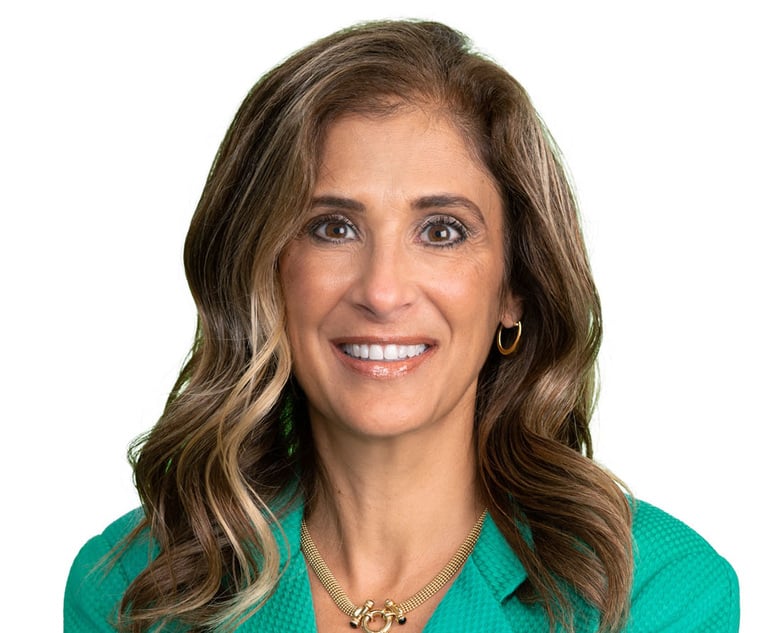Union Head Speaks Out Against DOJ in Wake of Phila. Immigration Judge's Removal
Judge Ashley Tabaddor, the president of the National Association of Immigration Judges, said new rules from U.S. Attorney General Jeff Sessions compromise the integrity of the nation's immigration courts.
September 21, 2018 at 04:45 PM
3 minute read
The original version of this story was published on National Law Journal
 Attorney General Jeff Sessions, left, and Ashley Tabaddor, president of the National Association of Immigration Judges.
Attorney General Jeff Sessions, left, and Ashley Tabaddor, president of the National Association of Immigration Judges.
The independence of the immigration courts system is under unprecedented political pressure after U.S. Attorney General Jeff Sessions moved to implement a tougher regime of quotas and deadlines for the backlogged courts, the head of a judges' union said Friday.
Judge Ashley Tabaddor, the president of the National Association of Immigration Judges, sounded the alarm on Sessions' rules in a press conference Friday. Tabaddor is an immigration judge in Los Angeles, but spoke in her role as the head of the union.
“This is an unprecedented act which compromises the integrity of the court and undermines the decisional independence of our immigration judges, all in the name of addressing the 750,000-backlog of cases which continue to grow with every action of this administration,” she said.
The Justice Department did not immediately respond to a request for comment.
Beginning Oct. 1, immigration judges will be required to complete 700 cases a year, under a plan that was unveiled by Sessions in a memo earlier this year. The Justice Department oversees the immigration courts system, which falls under Article 1. Sessions has long complained about the backlog of immigration cases, in part because they allow immigrants who face deportation to remain in the United States while their cases are pending.
But the new regime could endanger judges' jobs and immigrants' due process rights, Tabaddor said. She stressed that Sessions' directive placed excessive pressure on judges.
“Nobody is sitting there in the courtroom, twiddling their thumb,” she said.
The NAIJ president's comments are the latest sign of growing tensions between the group and Main Justice. Last month, the NAIJ filed a formal grievance with the Executive Office for Immigration Review, the DOJ office that oversees the immigration courts, after managers reassigned a Philadelphia immigration judge's cases.
Following the judge's removal, immigration lawyers in Philadelphia said the move was unusual but fit a pattern that is becoming very clear to both the bench and bar—immigration judges have far less autonomy than they did under previous administrations.
“It's really disturbing,” Philadelphia immigration attorney Matthew Archambeault said. “It sends a chilling message to the immigration judges—don't step out of line, and you don't have judicial independence.”
On Friday, Tabaddor insisted that if the Sessions were interested in making immigration courts more efficient, the DOJ could focus on shoring up resources, training and support staff for judges. Tabaddor said she hasn't spoken directly with Sessions, but would welcome the opportunity.
Tabaddor also called on Congress to remove the immigration courts from under the Justice Department's purview, describing the current set-up as a “fundamental flaw.”
Read More
Hear the Audio: 'Chilling' Immigration Court Hearings That Led to Grievance Against DOJ
This content has been archived. It is available through our partners, LexisNexis® and Bloomberg Law.
To view this content, please continue to their sites.
Not a Lexis Subscriber?
Subscribe Now
Not a Bloomberg Law Subscriber?
Subscribe Now
NOT FOR REPRINT
© 2025 ALM Global, LLC, All Rights Reserved. Request academic re-use from www.copyright.com. All other uses, submit a request to [email protected]. For more information visit Asset & Logo Licensing.
You Might Like
View All
Lawsuit Against Major Food Brands Could Be Sign of Emerging Litigation Over Processed Foods
3 minute read

People in the News—Jan. 23, 2025—Marshall Dennehey, Duane Morris, Hangley Aronchick
3 minute read
Plaintiff Argues Jury's $22M Punitive Damages Finding Undermines J&J's Talc Trial Win
4 minute readTrending Stories
- 1We the People?
- 2New York-Based Skadden Team Joins White & Case Group in Mexico City for Citigroup Demerger
- 3No Two Wildfires Alike: Lawyers Take Different Legal Strategies in California
- 4Poop-Themed Dog Toy OK as Parody, but Still Tarnished Jack Daniel’s Brand, Court Says
- 5Meet the New President of NY's Association of Trial Court Jurists
Who Got The Work
J. Brugh Lower of Gibbons has entered an appearance for industrial equipment supplier Devco Corporation in a pending trademark infringement lawsuit. The suit, accusing the defendant of selling knock-off Graco products, was filed Dec. 18 in New Jersey District Court by Rivkin Radler on behalf of Graco Inc. and Graco Minnesota. The case, assigned to U.S. District Judge Zahid N. Quraishi, is 3:24-cv-11294, Graco Inc. et al v. Devco Corporation.
Who Got The Work
Rebecca Maller-Stein and Kent A. Yalowitz of Arnold & Porter Kaye Scholer have entered their appearances for Hanaco Venture Capital and its executives, Lior Prosor and David Frankel, in a pending securities lawsuit. The action, filed on Dec. 24 in New York Southern District Court by Zell, Aron & Co. on behalf of Goldeneye Advisors, accuses the defendants of negligently and fraudulently managing the plaintiff's $1 million investment. The case, assigned to U.S. District Judge Vernon S. Broderick, is 1:24-cv-09918, Goldeneye Advisors, LLC v. Hanaco Venture Capital, Ltd. et al.
Who Got The Work
Attorneys from A&O Shearman has stepped in as defense counsel for Toronto-Dominion Bank and other defendants in a pending securities class action. The suit, filed Dec. 11 in New York Southern District Court by Bleichmar Fonti & Auld, accuses the defendants of concealing the bank's 'pervasive' deficiencies in regards to its compliance with the Bank Secrecy Act and the quality of its anti-money laundering controls. The case, assigned to U.S. District Judge Arun Subramanian, is 1:24-cv-09445, Gonzalez v. The Toronto-Dominion Bank et al.
Who Got The Work
Crown Castle International, a Pennsylvania company providing shared communications infrastructure, has turned to Luke D. Wolf of Gordon Rees Scully Mansukhani to fend off a pending breach-of-contract lawsuit. The court action, filed Nov. 25 in Michigan Eastern District Court by Hooper Hathaway PC on behalf of The Town Residences LLC, accuses Crown Castle of failing to transfer approximately $30,000 in utility payments from T-Mobile in breach of a roof-top lease and assignment agreement. The case, assigned to U.S. District Judge Susan K. Declercq, is 2:24-cv-13131, The Town Residences LLC v. T-Mobile US, Inc. et al.
Who Got The Work
Wilfred P. Coronato and Daniel M. Schwartz of McCarter & English have stepped in as defense counsel to Electrolux Home Products Inc. in a pending product liability lawsuit. The court action, filed Nov. 26 in New York Eastern District Court by Poulos Lopiccolo PC and Nagel Rice LLP on behalf of David Stern, alleges that the defendant's refrigerators’ drawers and shelving repeatedly break and fall apart within months after purchase. The case, assigned to U.S. District Judge Joan M. Azrack, is 2:24-cv-08204, Stern v. Electrolux Home Products, Inc.
Featured Firms
Law Offices of Gary Martin Hays & Associates, P.C.
(470) 294-1674
Law Offices of Mark E. Salomone
(857) 444-6468
Smith & Hassler
(713) 739-1250





